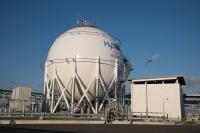The United Kingdom is showing a lack of support for Japan’s plan to use ammonia and hydrogen alongside fossil fuels in power plants to cut emissions, adding to skepticism over the technology’s ability to contribute to green goals.
"We have some concerns” about Japan’s co-firing plans, Naomi Cowan, head of climate change and energy at the British Embassy in Tokyo, said at a news conference on Friday. "It prolongs the life of coal plants and leads to emissions.”
Countries including Japan and South Korea are looking at co-firing, but the strategy has drawn criticism for being costly and inefficient. A recent report by the Breakthrough Institute found that the process could actually increase air pollution. Japan’s energy transition plans contradict pathways recommended by a United Nations body to help keep global warming from rising by 1.5 degrees Celsius, climate research group InfluenceMap said earlier this month.
Japan’s trade ministry wasn’t immediately available for comment.
There are also concerns about whether there will be enough global supply of ammonia and hydrogen, which will also be needed in other hard-to-abate sectors, Cowan said.
Resource-scant Japan, which relies on imported fossil fuel for its energy needs, has emphasized that it needs all tools available to decarbonize its economy. The country is also planning to expand its use of renewables, but says co-firing is necessary to ensure a stable supply of energy.
"Each country of course has their own situation and energy plan, and we’re not in a position to tell Japan to not move forward with co-firing,” Cowan said. "But looking at the impact to emissions and hard-to-abate sectors, we do have concerns.”



















With your current subscription plan you can comment on stories. However, before writing your first comment, please create a display name in the Profile section of your subscriber account page.